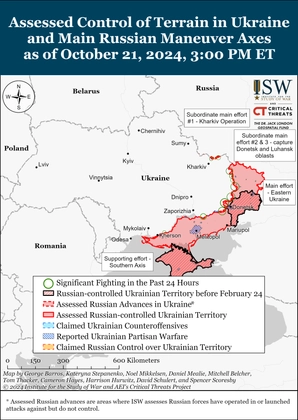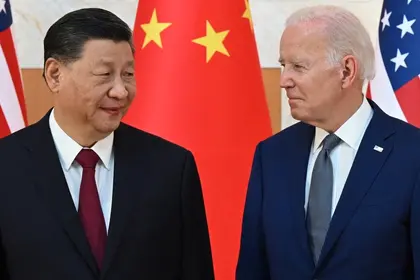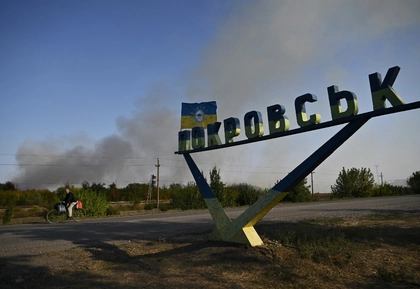Last week, the U.S. organized a master class for the whole world on how to manage military risks and neutralize the nuclear threat.
Russia finally deleted even verbal hints about the possibility of using tactical nuclear weapons from the agenda.
JOIN US ON TELEGRAM
Follow our coverage of the war on the @Kyivpost_official.
The Polish missile crisis, which was initially considered almost as a reason for the start of a defensive operation by NATO against Russia, was reduced to a routine investigation into the circumstances of the “missile fall” on the territory of Poland.
The Information Defense project attempted to get an understanding of the intricacies of these events, their causes and consequences.
The path to a bipolar world
After the end of the Cold War, the U.S. dominated on the geopolitical chessboard, taking over monopoly influence on the world order. However, over time, two more countries – Russia and China – began to claim the role of the second center of power.
The Russian-Ukrainian war finally proved that the world will definitely no longer be monopolar, as it is gradually turning into a bipolar construction of the U.S. and China.
The benchmark point on the path to the Sino-American world was undoubtedly the meeting between U.S. President Joe Biden and Chinese President Xi Jinping before the recent G 20 summit in Bali.
All the nuances and consequences of the meeting are still being analyzed by leading world experts. We will focus on at least one aspect that was discussed in Bali on Nov. 15-16, and an extremely important one: reducing the risk of Russia’s use of tactical nuclear weapons.

ISW Russian Offensive Campaign Assessment, October, 22, 2024
During the Russian-Ukrainian war, some Russian leaders and propagandists have repeatedly stated on state-run channels that Russia was ready to use nuclear weapons to protect its sovereignty. Some experts assessed these statements merely as undisguised blackmail. Others see the real possibility of a tactical nuclear strike as part of the doctrine of “de-escalation through escalation,” when the use of weapons of mass destruction would cause the collective West to back down against Russia.
Since the spring of 2022, the USA has been sending clear signals: after a Russian nuclear strike, NATO will not stop, and the consequences for Russia and for Putin personally in this case will be catastrophic.
On the eve of the G20 summit, Nov. 14, the director of the Central Intelligence Agency, William Burns, held talks in Ankara with the director of Russia’s Foreign Intelligence Service, Sergei Naryshkin. The Kremlin was once again shown that neither virtual nor real nuclear blackmail will stop the U.S.
During his extraordinary visit to Ukraine, Burns immediately informed President Zelensky about the results of the negotiations. Ukraine had its own role in this geopolitical game. Kyiv had to once again publicly and vividly demonstrate its readiness for peace negotiations with Russia.
Ukraine played this role brilliantly. In his speech to the leaders of 19 countries that control 80 percent of the world economy, President Zelensky clearly outlined a 10-point peace plan that once again proved that Ukraine is a country that wants peace, but a just peace, based on the UN charter.
The American master class on reducing the nuclear threat finished on Nov. 15 in Bali during the meeting between Joe Biden and Xi Jinping. According to the results of the meeting, China declared that it is categorically against the threat or use of nuclear weapons. This position of a recent ally came as a cold shower for the Russian authorities, who have always counted on the specter of a nuclear prop.
If you carefully analyze the Russian mass media and statements made by Russian politicians, you can see for yourself that the topic of a nuclear attack has disappeared from the current agenda and moved to the informational fringes.
On the other hand, the international community had convinced itself that neither Russia nor China can claim the role of the second pole in our world. It’s just that in 2022, by the right of the strong, China has finally turned into the second center of power.
A nuclear war is of no benefit to anyone – neither to the outspoken opponents of the Russian empire, nor to China, which has begun to take an increasingly neutral position in the Russian-Ukrainian military confrontation.
Only one question remains open – what decisions will Putin make when he is driven into the corner of final defeat in the Russian-Ukrainian war, the threat of loss of personal power and physical destruction? Will he dare to launch a nuclear strike under such conditions?
After all, then he will have nothing to lose.
Polish missile crisis
The Russia-Ukraine war threatened to spill over into NATO territory on Tuesday, Nov. 15, when an unidentified rocket fell in neighboring Poland, killing two people. In time, this dramatic event happened as part of Russia’s massive missile attack on Ukrainian critical infrastructure, which raised suspicions that the missile that went into Poland was Russian.
Initially, the situation developed according to the classic scenario of escalation, which in its final outcome could lead to the start of a full-scale war between the North Atlantic Alliance and Russia.
The Polish authorities convened an emergency meeting of their National Security Committee and invited consultations within the framework of Article 4 of the Washington Treaty. President Joe Biden held an emergency meeting with NATO allies during the G20 summit.
The world was waiting for the final conclusions: the missile was Russian, it was an attack on a NATO member country and, therefore, the allies must be ready for military action.
In conditions of total mistrust, every step taken by the opposing side would be perceived as a step towards increasing the threats. If any of our readers would like to get acquainted with how this mechanism works in more detail, then we would refer them to the novel The Sum of all Fears by Tom Clancy.
But as if by a wave of a magic wand, tensions began to subside. Poland refused consultations and said it was necessary to carry out a thorough investigation into the circumstances of the missile’s fall on Polish territory. In the end, Polish President Duda and President Biden made it clear that it was most likely a Ukrainian air defense missile of the S-300 system. Unfortunately, it did not hit the target and did not self-destruct.
You can read about the details of the American master class on reducing the level of the crisis in an article entitled “The USA seeks to support Ukraine, but to contain the war” by The Washington Post columnist David Ignatius.
No-one was going to blame Ukraine. The main culprit was Russia, which has been waging war against Ukraine for the past eighth months and is launching massive missile attacks on peaceful cities. Our country is only defending itself against enemy attacks, and only under unforeseen circumstances did a Ukrainian anti-aircraft missile fly into the territory of Poland.
So, what have we learned from all this?
First, a lesson for the Ukrainian authorities.
We are expected to be holier than the Pope. It is impossible for President Zelensky to publicly announce unverified information that is too sensitive for our Western partners and that could, theoretically, lead to a global nuclear catastrophe.
The lesson for Ukrainian society is equally important.
We have learned once again that no-one will fight for us. The task of the U.S. is to support Ukraine, provide it with military and technical assistance, and ensure the defeat of Russia.
At the same time, the Americans are doing everything to prevent escalation of the war, the catastrophic collapse of Russia, and a global nuclear war.
This is not a simple task.
Ihor Zhdanov is a co-founder of the Open Policy Foundation, a Non-Government Organization (NGO) in Ukraine.
The views expressed in this opinion piece are the author’s and not necessarily those of Kyiv Post.
You can also highlight the text and press Ctrl + Enter






